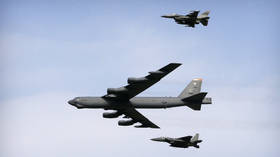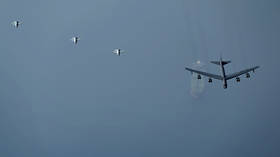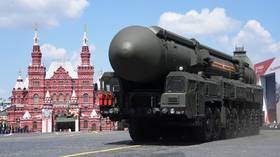US issues nuclear warning to ally

The US has urged Australia not to sign a treaty seeking to ban all nuclear weapons, claiming the agreement will reinforce “divisions” between world powers, while failing to address “prevailing security threats” around the globe.
In a statement to The Guardian on Tuesday, the US Embassy in Canberra said Australia’s signature on the treaty “would not allow for US extended deterrence relationships,” referring to the US ‘nuclear umbrella’ which vows to protect some non-nuclear states with America’s massive atomic arsenal.
“While the United States understands and shares the desire to advance nuclear disarmament goals, we do not support the Treaty on the Prohibition of Nuclear Weapons,” an embassy spokesperson told the outlet, adding that Washington “does not believe that progress toward nuclear disarmament can be decoupled from the prevailing security threats in today’s world.”
The comments come after the Australian government signaled a shift in position toward the Treaty on the Prohibition of Nuclear Weapons at the United Nations, with Canberra’s envoy choosing to abstain from a vote on the measure after previous administrations consistently voted against it.
Unlike the Non-Proliferation Treaty (NPT) of 1968, which contains only partial restrictions, the newer Treaty on the Prohibition of Nuclear Weapons seeks to create a legally binding ban on all nuclear weapons, including testing and stockpiling such arms. While a number of nuclear powers have signed the NPT, none have yet approved the latter treaty, which has only garnered non-nuclear signatories since it was introduced in 2017.
Though Canberra signed the NPT in 1970 and has since been a general proponent of nuclear disarmament, it has long been under the US nuclear umbrella – a vestige of the Cold War-era ANZUS security pact which sought to keep Australia and New Zealand away from Soviet influence. New Zealand renounced all nuclear weapons and declared itself a nuclear-free zone in the 1980s, even prohibiting some American nuclear-powered ships from docking on the island, but Australia has not taken the same steps.
Despite the evolving stance toward the prohibition treaty by the government of Prime Minister Anthony Albanese, the US is nonetheless looking to station nuclear-capable strategic bombers on Australian territory and effectively turn the country into a military hub geared against China, according to a local investigative report. Under the Pentagon proposal, six B-52 Stratofortresses would reportedly be deployed at a new US-built “squadron operations facility” near the Royal Australian Air Force military air base Tindal.














